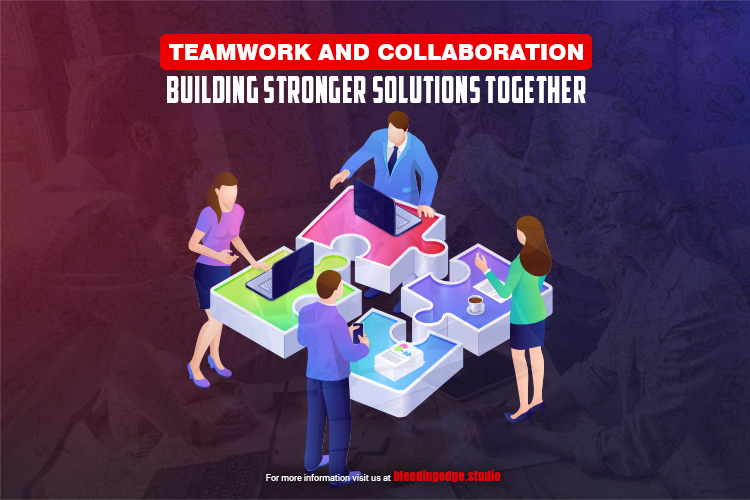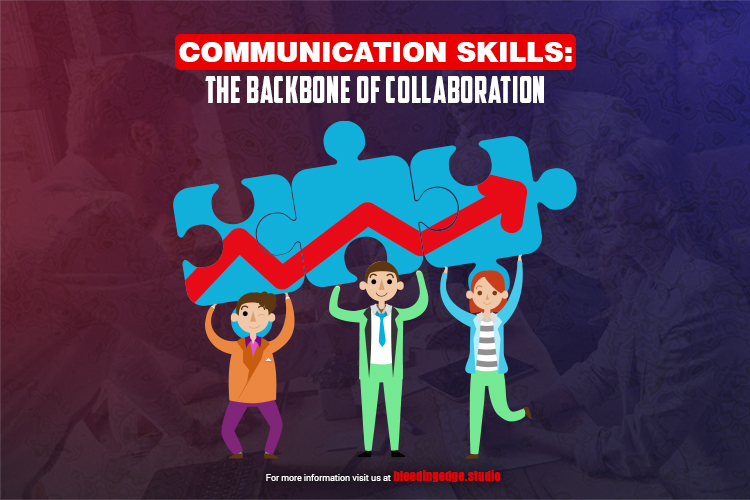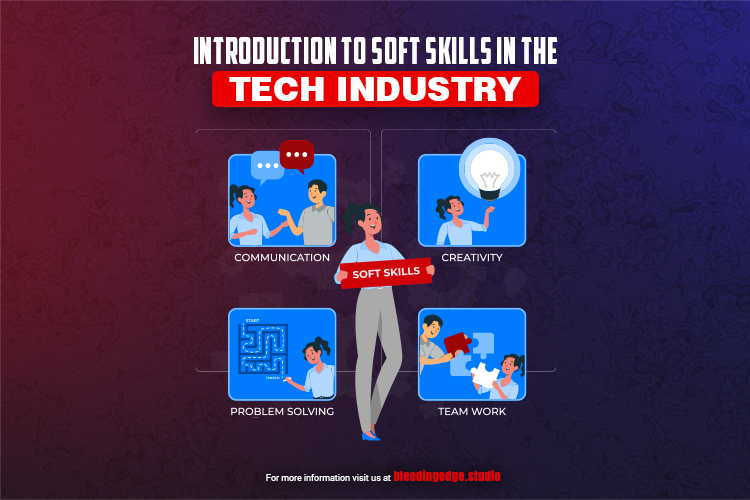In the ever-evolving world of the Soft skills tech industry , where innovation and technical prowess reign supreme, there’s a powerful force that often gets overlooked: soft skills. While technical skills are undoubtedly crucial in building and maintaining technology, it’s the human element that truly drives success and innovation in this field. In this article, we delve into the significance of soft skills in the tech industry and why mastering them is essential for professionals aiming to thrive in this fast-paced environment.
Defining Soft Skills
Soft skills, referred to as interpersonal skills or people skills, focuses a wide range of non-technical abilities that facilitate effective communication, collaboration, and relationship building. These skills are inherently human and revolve around emotional intelligence, empathy, communication, adaptability, and problem-solving.
The Changing Landscape of the Tech Industry
Traditionally, the tech industry has been perceived as a domain dominated by individuals with strong technical aptitude. While technical expertise remains highly valued, the landscape is rapidly shifting towards a more holistic approach that acknowledges the importance of soft skills. With the rise of interdisciplinary collaboration, agile methodologies, and user-centric design principles, the ability to effectively communicate and collaborate with diverse teams has become indispensable.
The Importance of Soft Skills in Tech
- Effective Communication: In a field characterized by complex concepts and rapid innovation, the ability to convey ideas clearly and concisely is paramount. Whether it’s explaining technical concepts to non-technical stakeholders, articulating project requirements, or providing constructive feedback, effective communication fosters understanding and drives alignment within teams.
- Collaboration and Teamwork: The tech industry keeps on collaboration, with cross-functional teams working together to solve intricate problems and deliver innovative solutions. Strong interpersonal skills enable individuals to work harmoniously within diverse teams, leveraging collective expertise and perspectives to achieve common goals.
- Empathy and User-Centricity: Beyond technical proficiency, successful tech products and services are characterized by their ability to address the needs end-users. Empathy, the ability to understand others’ emotions and experiences, is instrumental in designing intuitive and user-centric solutions that resonate with their intended audience.
- Adaptability and Problem-Solving: In a rapidly evolving industry where change is constant, adaptability is a prized attribute. Professionals adept at navigating ambiguity, embracing change, and quickly adapting to new technologies and methodologies are better managed to overcome challenges and seize opportunities for innovation.
Cultivating Soft Skills in the Tech Industry
While technical skills can be gained through formal education and technical training, soft skills are often developed through experience, self-awareness, and intentional practice. Employers can foster a culture that values and promotes soft skills development by:
- We are providing opportunities for interdisciplinary collaboration and cross-functional training.
- Offering workshops, seminars, and coaching sessions focused on communication, emotional intelligence, and conflict resolution.
- They are encouraging continuous feedback and fostering a supportive environment where employees feel empowered to voice their opinions and ideas.
Introduction to Soft Skills in the Tech Industry
In the fast-paced and highly technical world of the tech industry, it’s easy to become fixated on mastering coding languages, staying abreast of the latest technological advancements, and honing technical expertise. However, amidst the lines of code and intricate algorithms, there lies an equally important aspect that often goes unnoticed but is fundamental to success: soft skills.
Soft skills, often overshadowed by their technical counterparts, are the interpersonal attributes that let individuals to interact with others and navigate various social situations effectively. In the context of the tech industry, where innovation and collaboration are drivers of success, the importance of soft skills cannot be overstated.
In this introductory exploration of soft skills in the tech industry, we’ll delve into the core competencies that constitute soft skills, examine their relevance in a tech-centric environment, and highlight why they are essential for professionals aiming to thrive in this dynamic field. From effective communication to adaptability and empathy, we’ll uncover how soft skills serve as the cornerstone of success in the ever-evolving landscape of technology.
Teamwork and Collaboration: Building Stronger Solutions Together
In the fast-paced and ever-evolving world of the tech industry, teamwork and collaboration are not just buzzwords; they are essential components for driving innovation and success. While individual brilliance certainly has its place, it’s the collective effort of diverse teams working together that often leads to groundbreaking solutions and transformative breakthroughs.

In the realm of software development, for instance, a multidisciplinary team comprising developers, designers, product managers, and quality assurance specialists must collaborate seamlessly to create user-friendly applications that meet the requirements of their target audience. Each team member brings a different set of skills, perspectives, and experiences to the table, and it’s through collaboration that these disparate elements coalesce into a cohesive whole.
Effective teamwork in the tech industry goes beyond mere cooperation; it requires open communication, mutual respect, and a shared commitment to a common goal. By fostering an environment where team members feel empowered to voice their ideas, challenge assumptions, and offer constructive feedback, organizations can harness the intelligence of their teams and unlock new realms of innovation.
Furthermore, the iterative nature of many tech projects, such as Agile and DevOps methodologies, underscores the importance of collaboration. Cross-functional teams collaborate closely throughout the development lifecycle, continuously iterating on feedback and adapting to changing requirements. This iterative approach not only accelerates the pace of innovation but also fosters a culture of continuous improvement and learning within the organization.
Moreover, effective collaboration extends beyond internal teams to encompass partnerships with external stakeholders, including clients, vendors, and industry partners. By collaborating with external partners, organizations can leverage complementary expertise, access new markets, and accelerate the development and deployment of innovative solutions.
Ultimately, the ability to collaborate effectively is not just a desirable trait in the tech industry; it’s a critical competency that separates successful organizations from their competitors. By building solid teams that value collaboration, communication, and collective problem-solving, organizations can navigate the complexities of the tech landscape with agility, resilience, and ingenuity. As the adage goes, “Alone we can do so little; together we can do so much.” In the tech industry, this sentiment rings more accurate than ever.
Communication Skills: The Backbone of Collaboration
In the dynamic and fast-paced environment of the tech industry, effective communication serves as the linchpin that holds teams together and drives successful collaboration. Whether it’s conveying complex technical concepts, articulating project requirements, or providing feedback, clear and concise communication is paramount for fostering understanding, alignment, and cohesion within teams.

One of the primary challenges in the tech industry is bridging the communication gap between technical and non-technical stakeholders. Engineers, developers, and data scientists often possess deep technical expertise but may struggle to communicate their ideas in a way that is accessible to those outside their field. Conversely, business stakeholders and clients may have specific requirements and expectations that need to be effectively communicated to technical teams.
Practical communication skills enable individuals to translate technical jargon into layperson’s terms, facilitating meaningful dialogue and ensuring that all stakeholders are on the same page. Whether it’s through written documentation, presentations, or face-to-face meetings, the ability to convey ideas clearly and succinctly is essential for driving alignment and preventing misunderstandings.
Moreover, effective communication is not just about transmitting information; it’s also about active listening and empathetic engagement. By actively listening to the perspectives and concerns of others, individuals can foster trust, build rapport, and demonstrate respect for their colleagues’ contributions. Empathetic communication, which involves understanding and resonating with others’ emotions and experiences, is essential in fostering collaborative relationships and resolving conflicts constructively.
Alongwith verbal communication, written communication skills are also crucial in the tech industry, where documentation, emails, and project reports are ubiquitous. The ability to communicate ideas coherently and persuasively through written channels is essential for conveying technical specifications, documenting project progress, and collaborating asynchronously across distributed teams.
Furthermore, in an era of remote work and virtual collaboration, effective communication becomes even more critical. Virtual communication platforms, such as video conferencing, instant messaging, and project management tools, play a central role in facilitating remote collaboration. However, mastering virtual communication requires additional skills, such as managing time zones, overcoming cultural barriers, and leveraging technology to foster engagement and connectivity.
In conclusion, communication skills are not just lovely to have in the tech industry; they are a foundational competency that underpins successful collaboration, innovation, and teamwork. By honing their communication skills, tech professionals can bridge the distance between technical and non-technical stakeholders, foster a culture of transparency and trust, and drive meaningful progress toward shared goals. In the fast-paced and interconnected world of technology, effective communication is not just a skill—it’s the key to unlocking the full potential of teams and driving impactful change.
Emotional Intelligence: Navigating Interpersonal Dynamics
In the fast-paced and high-pressure environment of the tech industry, where deadlines loom large and challenges abound, emotional intelligence (EI) emerges as a critical skill for navigating interpersonal dynamics and fostering productive relationships. Unlike technical skills, which are often tangible and measurable, emotional intelligence refers to the ability to recognize, understand, and manage one’s own emotions as well as those of others.

In the context of the tech industry, where teams are diverse and collaboration is essential, emotional intelligence plays a pivotal role in promoting empathy, fostering teamwork, and mitigating conflicts. Tech professionals with high emotional intelligence are adept at navigating the complex social dynamics inherent in team environments, building rapport with colleagues, and effectively managing interpersonal relationships.
One of the critical components of emotional intelligence is self-awareness—the ability to recognize and understand one’s own emotions, strengths, and weaknesses. Self-aware individuals are better equipped to regulate their emotions, maintain composure under pressure, and make sound decisions in stressful situations. In the fast-paced and ever-changing landscape of the tech industry, where ambiguity and uncertainty are par for the course, self-awareness enables individuals to adapt and thrive in the face of adversity.
Moreover, emotional intelligence encompasses empathy—the ability to understand the emotions and experiences of others. Empathetic leaders and team members are skilled at actively listening to their colleagues, validating their perspectives, and providing support and encouragement when needed. By fostering a culture of empathy and inclusivity, organizations can cultivate a sense of belonging and psychological safety within their teams, empowering individuals to contribute their best work and collaborate effectively towards shared goals.
Another critical aspect of emotional intelligence is social awareness—the ability to recognize and understand the emotions and needs of others. Socially aware individuals are attuned to nonverbal cues, cultural nuances, and interpersonal dynamics, allowing them to navigate complex social situations with grace and tact. In the tech industry, where teams are often multicultural and geographically dispersed, social awareness is vital for building trust and fostering cohesive teamwork across diverse backgrounds and perspectives.
Furthermore, emotional intelligence plays a crucial role in conflict resolution and team dynamics. Tech professionals with high emotional intelligence are skilled at managing interpersonal conflicts, facilitating constructive dialogue, and finding mutually beneficial solutions to disagreements. By fostering a culture of open communication and emotional resilience, organizations can transform conflicts into opportunities for growth and innovation, driving positive change within their teams and across the broader organization.
In conclusion, emotional intelligence is not just a soft skill; it’s a fundamental competency that underpins effective leadership, teamwork, and collaboration in the tech industry. By cultivating emotional intelligence among employees and leaders, organizations can create a culture of trust, empathy, and resilience that enables individuals to thrive and succeed in the fast-paced and ever-changing world of technology. In an industry driven by innovation and collaboration, emotional intelligence emerges as a powerful catalyst for driving positive change and shaping the future of technology.
Continuous Learning and Growth: Staying Relevant in a Rapidly Evolving Industry
In the fast-paced and ever-changing landscape of the tech industry, the only constant is change. With new technologies emerging at an unprecedented pace and industry trends evolving rapidly, staying relevant requires a commitment to continuous learning and professional growth. In this final segment, we explore the importance of lifelong learning in the tech industry and strategies for staying ahead in a dynamic and competitive environment.
The Need for Lifelong Learning
In an industry where yesterday’s cutting-edge technology can quickly become obsolete, the ability to adapt and learn continuously is essential for staying relevant. Lifelong learning not only enables professionals to keep pace with emerging trends and technologies but also empowers them to anticipate future developments and seize new opportunities for innovation and growth.
Moreover, the tech industry is characterized by its interdisciplinary nature, with boundaries blurring between traditional roles and skill sets. Professionals are expected to possess a diverse skill set encompassing technical expertise, soft skills, and domain knowledge. By embracing lifelong learning, individuals can broaden their skill set, explore new domains, and position themselves for success in an ever-expanding array of roles and responsibilities.
Strategies for Continuous Learning
- Embrace Online Learning Platforms: With the proliferation of online learning platforms such as Coursera, Udemy, and LinkedIn Learning, access to high-quality educational resources has never been easier. Professionals can leverage these platforms to upskill in areas relevant to their career goals, whether it’s mastering a new programming language, learning about emerging technologies, or enhancing their soft skills.
- Attend Workshops and Conferences: Workshops, seminars, and conferences provide valuable opportunities for networking, knowledge sharing, and professional development. By attending industry events and conferences, professionals can stay abreast of the latest trends and best practices, gain insights from thought leaders and experts, and expand their professional network.
- Engage in Project-Based Learning: Hands-on, project-based learning is an effective way to acquire new skills and deepen existing knowledge. Whether through personal projects, hackathons, or collaborative initiatives within their organization, professionals can gain practical experience and demonstrate their proficiency in real-world scenarios.
Conclusion: Integrating Soft Skills for Career Success in Tech
In the dynamic and rapidly evolving landscape of the tech industry, technical expertise alone is no longer sufficient for career success. As the industry continues to emphasize collaboration, innovation, and user-centricity, the importance of soft skills has come to the forefront. From effective communication and teamwork to emotional intelligence and adaptability, mastering soft skill is essential for professionals aiming to thrive in the ever-changing world of technology.
Throughout this exploration, we’ve highlighted the vital role that soft skills play in driving success and innovation in the tech industry. Effective communication serves as the backbone of collaboration, enabling individuals to convey ideas clearly, bridge the gap between technical and non-technical stakeholders, and foster a culture of transparency and trust. Teamwork and collaboration facilitate the pooling of diverse perspectives and expertise, driving innovation and problem-solving within multidisciplinary teams. Emotional intelligence empowers individuals to navigate interpersonal dynamics, build rapport with colleagues, and foster a culture of empathy and inclusivity.
As the tech industry continues to evolve, organizations are recognizing the importance of integrating soft skills into their hiring, training, and development practices. By fostering a culture that values and promotes soft skills, organizations can unlock new opportunities, drive innovation, and cultivate a workforce that is agile, resilient, and adaptable.
For professionals looking to advance their careers in tech, investing in the development of soft skills is essential. Whether through formal training programs, coaching sessions, or self-directed learning, individuals can hone their communication, collaboration, and emotional intelligence skills to become more effective leaders, teammates, and contributors. By integrating soft skill into their skill set, tech professionals can position themselves for success in an industry that values not only technical expertise but also the human element.
In conclusion, mastering soft skills is not just a nice to have; it’s a prerequisite for career success in the tech industry. By embracing effective communication, fostering teamwork and collaboration, and cultivating emotional intelligence, individuals can navigate the complexities of the tech landscape with confidence, resilience, and ingenuity. As technology continues to shape the world around us, those who excel in both technical and soft skills will emerge as the leaders and innovators of tomorrow’s tech-driven future.
For more topics, see https://bleedingedge.studio/blog/

